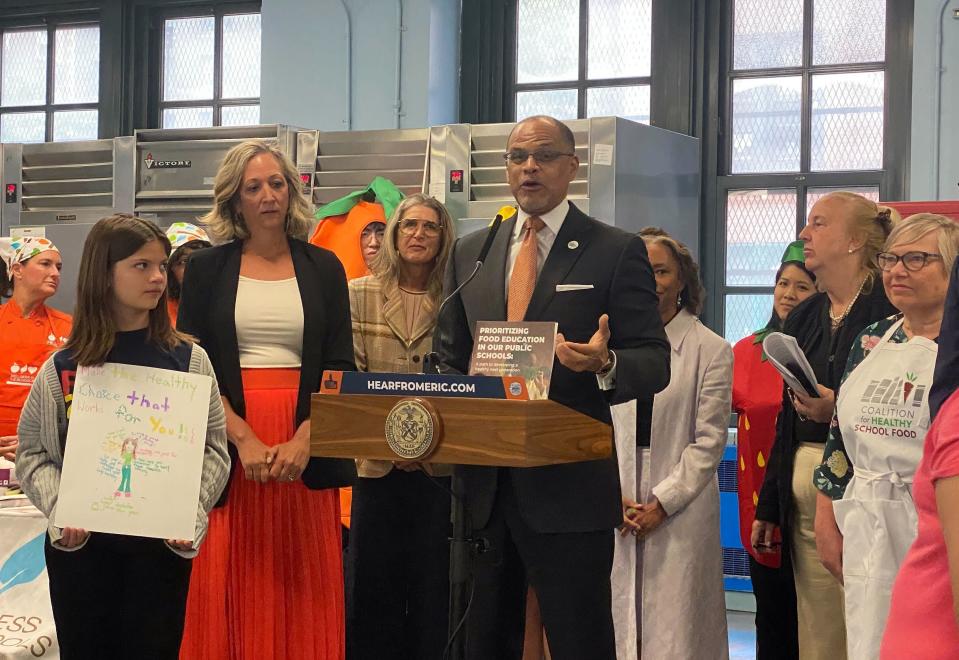Attention NYC students: Mayor Adams wants to know if you’re eating your vegetables
- Oops!Something went wrong.Please try again later.
Attention NYC public school students: Mayor Adams wants to know if you are eating your vegetables.
As part of the mayor’s continuing efforts to instill healthier eating habits in youngsters across the five boroughs, the city says it will explore ways to better track what kids are eating — and what they’re tossing into the trash.
“This is a really, it’s time to eat your broccoli moment,” Adams said Tuesday at PS 75 Emily Dickinson on the Upper West Side. “We may complain about it in the beginning, but then we do a reflection of our health care needs and realize that mama was right all along, eat your vegetables.”
Adams and his schools chancellor, David Banks, were rolling out a new plan to promote healthy eating in public schools, including a push to integrate food education into the regular school day — from core subjects such as English and math to field trips and after-school programs — and tackle a problem that is hard to swallow. He has earmarked $1 million in next year’s city budget to help drive the effort.
Roughly 44% of local public schools — or 815 programs — lack food education programs, especially high schools, according to city data. The data also show that 40% of students are considered overweight or obese, which disproportionately affects Black and Latino children.
Lessons under the plan could cover hands-on food preparation, visits to farmers markets and botanical gardens, schoolwide assemblies and instruction in classrooms and school gardens.
The city will also create a “food education guidebook” for principals to reference while designing their programs, and offer professional development on the subject to preschool-through-12th-grade teachers and child-care providers.
Officials said they will collect data on schools and child-care sites offering the new programming, as well as teachers trained and the ages of kids served.
To track if students are selecting plant-based food options, the city Education Department will measure their choices and publish annual reports. Exactly how the department is going to do that remains unclear, but the plan includes a potential study on plate waste and student school lunch habits.
“We know it’s not going to be perfect,” said Adams, who credits a mostly plant-based diet with reversing his diabetes diagnosis. “All of a sudden, you’re not going to go from hamburger to health — that’s just not a reality. But, it has to start.”
The blueprint released Tuesday also builds on previously announced programs, from vegan lunches and scratch-based recipes to capital improvements at school cafeterias and certifying kitchens at 87 public schools to serve halal food.
Banks, who said he stopped eating red meat in the 11th grade, called for a change in eating habits at the youngest ages.
“As a result of that, my four children have never had red meat in their lives,” said Banks. “They’ve never missed it because I made sure that they had healthier alternatives.”
“Now, there’s a lot of other stuff that I eat that I shouldn’t eat — but as the mayor would say, we are perfectly imperfect.”
But families who have lost their appetite for cafeteria food may be hard to win over.
The rollout comes as a trial is underway in Brooklyn Federal Court over an alleged bribery scheme where students were served oozing red chicken and other inedible foods in 2016, according to prosecutors.
“We understand that rebuilding that trust is crucial,” said Adams.
“I’m not familiar with that exact case,” he added, “but we started out from the beginning with the chancellor looking over how we’re purchasing items, how do we make sure that there’s no fraud or abuse inside our system.”


